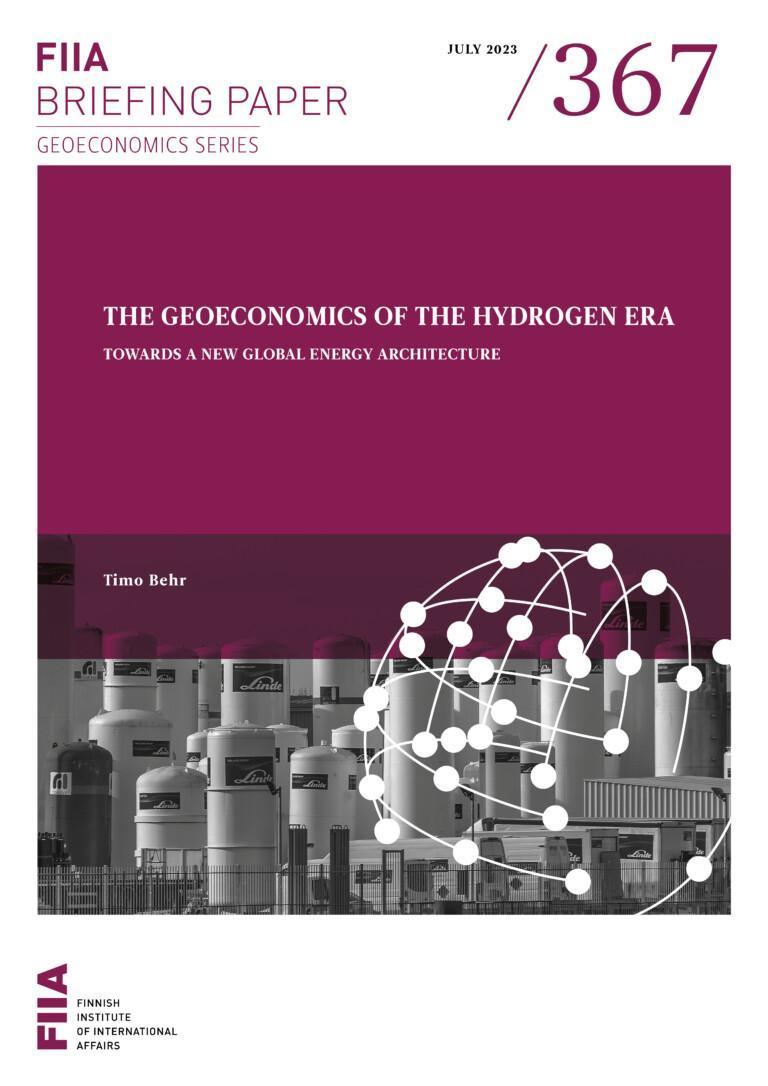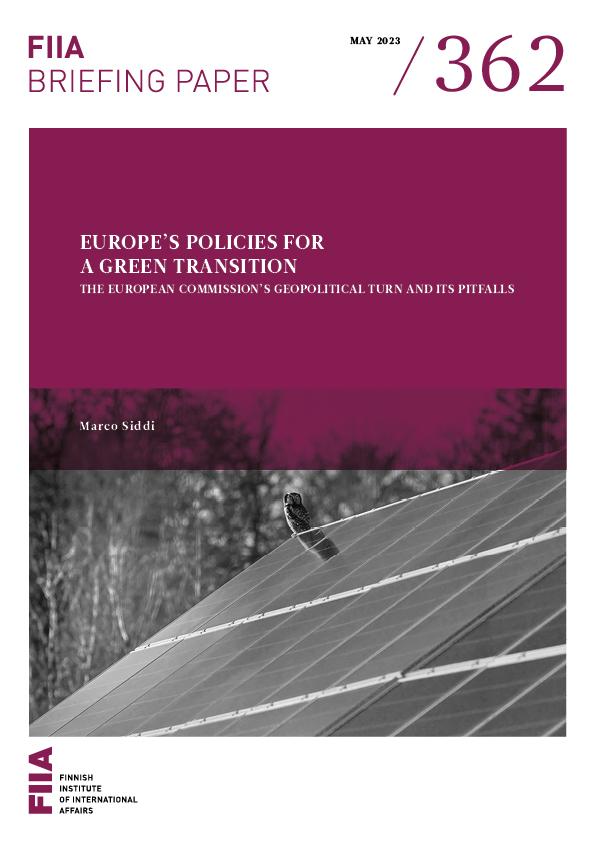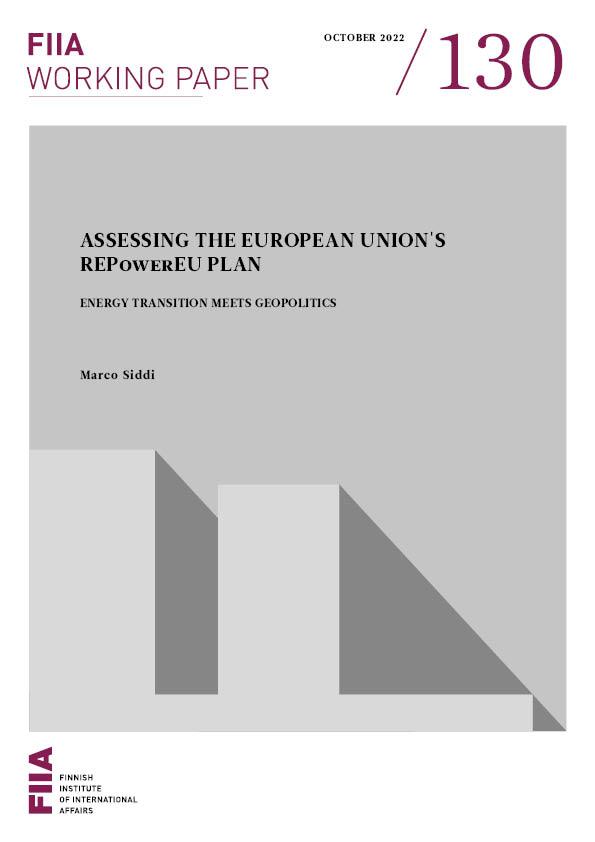
Clean hydrogen is crucial for ensuring the transition to a carbon-neutral economy, and large quantities of it will be needed in the future. The transition from a hydrocarbon to a hydrogen economy will have significant geopolitical and geoeconomic consequences.
Due to its unique properties, hydrogen will not become the “new oil”. While oil and gas have encouraged a concentration of power – in the hands of producer countries, major oil companies, and around strategic choke points – hydrogen will favour a dispersion of power.
The transition to a hydrogen economy will see strong competition over technologies, raw materials, and regulatory standards.
Hydrogen has the potential to make the world energy trading system more balanced, more democratic, and less prone to price fluctuations, but it could equally lead to fragmentation, inadvertently contributing to current geopolitical divisions.
For the EU and Finland, the transition towards a hydrogen economy presents both challenges and opportunities. Concerted action and active diplomacy will be needed to prevent Europe from being overtaken by others and slipping into new dependencies.
Introduction
The smallest molecule in the universe has the potential to generate large geoeconomic shifts. Hydrogen is a critical ingredient for propelling the world towards a carbon-neutral future. Green hydrogen, produced through the electrolysis of water, is a versatile energy carrier that can be transported, combusted, converted into electricity, or used as feedstock. Massive amounts of clean hydrogen will be needed to decarbonize hard-to-abate sectors of the economy.
The production, shipment, and consumption of large quantities of hydrogen will have a significant impact on the global energy infrastructure. It will create winners and losers, impose new dependencies, and stoke geoeconomic rivalries. While we are in the very early stages of this transition, global competition is likely to accelerate quickly over the next decade.
This Briefing Paper examines the geoeconomic impact of hydrogen as we move into a new era. It outlines some growth expectations for the hydrogen economy, scrutinizes hydrogen’s geoeconomic qualities, and considers the possible impact of the hydrogen economy on global dependencies and competition. The paper concludes with some general considerations of the implications of the hydrogen era for the European Union and Finland.
Dawn of the hydrogen era?
Recent years have seen a rapid acceleration in international efforts to transition towards a carbon-neutral future. Finland hopes to be one of the first countries to attain carbon neutrality by 2035, with the EU and the United States set to follow by 2050 at the latest, China targeting 2060, and India 2070. Even some of the major oil-producing countries have now joined the fray and adopted firm targets for net zero emissions, with the United Arab Emirates targeting 2050 and the Kingdom of Saudi Arabia and Kuwait eyeing carbon neutrality by 2060. According to the Net Zero Tracker, by May 2023, 148 countries covering 88% of global greenhouse gas emissions and 92% of global GDP had announced net zero targets.[1]
While renewable power, electrification, and energy savings will account for the lion’s share of these reductions, there is a strong scientific consensus that net zero emissions cannot be achieved without the widespread use of clean hydrogen and its derivatives. In particular, there are few alternatives to hydrogen in a number of hard-to-abate sectors, including heavy industry, shipping, aviation, and heavy-duty transport. Hydrogen can be produced in a number of ways, named after colours, but not all of them are carbon neutral:
- Brown/black: Hydrogen extracted from coal and lignite using gasification
- Grey: Hydrogen extracted from gas using steam-methane reforming
- Blue: Hydrogen produced from fossil fuels, but CO2 is either captured or stored
- Green: Hydrogen produced by electrolysis using renewable energy with zero emissions
- Purple: Hydrogen produced by electrolysis using nuclear power
An estimated 120 million tons of hydrogen are currently being produced annually – primarily for use in the chemical and fertilizer industry. The vast majority of this is either grey or brown/black hydrogen, producing considerable emissions. Only 800 kilotons, less than one per cent of current annual production, is considered clean hydrogen (blue/green). Of this, the vast majority is blue hydrogen, with green hydrogen representing a tiny percentage.
To meet emissions targets, estimates suggest that global production will need to increase to 660 million tons of clean hydrogen by 2050 and that over 70% of that production has to be green hydrogen (as shown in Figure 1). This will require vast investments in electrolysers to produce green hydrogen, in wind and solar farms to produce the required renewable energy, in transport infrastructure and storage, and in applications such as fuel cell technology.

The renewable electricity required to produce these large quantities of green hydrogen may amount to 21,000 TWh by 2050, just short of the global electricity consumption of 25,300 TWh in 2021. Similarly, installed electrolysis capacity will have to grow from approximately 700 MW in 2022 to some 700 GW in 2050 – a thousandfold increase. There is also a need to scale technologies, set up liquid markets, and develop regulatory frameworks and standards.
Recent forecasts project that the annual hydrogen market may grow at a faster pace than previously expected, generating over USD 640 billion in revenue in 2030 and USD 1.4 trillion in 2050.[2] This compares with a market size for crude oil of USD 2.1 trillion in 2022.
Unsurprisingly, the challenges and opportunities provided by clean hydrogen have attracted widespread interest, with a growing number of countries jostling to secure their place in the emerging hydrogen value chain. Some countries in Europe and Asia are concerned about the future of their industrial base, others hope that hydrogen will replace rents derived from fossil fuels, and some hope it will allow them to industrialize and diversify their economies. Moreover, hydrogen has the potential to upend current patterns of global production, create new trade routes and dependencies, and fuel a global race for technology.
Many of these expected changes will not be immediate, as the expansion of hydrogen production and trade will be hampered by a lack of economies of scale, immature technological solutions, and the absence of integrated markets and supply chains. Growth in the hydrogen economy may hit a takeoff point in the mid-2030s, when green hydrogen is expected to become price competitive with blue and grey hydrogen, reducing the risk of stranded assets and enabling a significant scaling of production. Still, the race for the future control of the hydrogen market is likely to be decided in the 2020s, as countries lock in investments, supply chains, and regulations, and companies decide on long-term investments.
As in previous technological transitions, the gains from hydrogen will not be equally distributed. There will be clear winners and losers. Some countries will thrive, while others will see their comparative advantage eroded. Domestic and international tension may result, unless this transition is well managed. While Europe has a lead in some hydrogen technologies, there is increasing nervousness over losing another vital sector to China and the United States.
The geopolitical qualities of hydrogen
The geopolitical map of the hydrogen era will be shaped by the underlying characteristics of the emerging hydrogen market – just as the geopolitical map of the hydrocarbon era was shaped by the market fundamentals of oil, gas and coal. Perhaps the most significant difference between the two eras is related to the concentration of power. Oil in particular encouraged the concentration of power in the hands of OPEC, major oil companies, and around strategic choke points, whereas the transition to hydrogen will lead to a dispersion of power. This has to do with some of the unique characteristics of hydrogen and its emerging future value chain, which are scrutinized in more detail below (see also Table 1).
First, unlike oil, hydrogen is manufactured, not extracted. In principle, it can be produced anywhere on the planet. Initially, countries with access to cheap gas for the production of blue hydrogen will have a price advantage. This will erode in the 2030s, when green hydrogen becomes price competitive. In addition to energy, the production of green hydrogen requires quantities of clean water. Water-scarce countries may therefore face some internal trade-offs. Nevertheless, the ubiquitous nature of hydrogen means that the global energy system will no longer depend on a small circle of producers.
Second, countries with an abundance of wind, sun and available land will have a natural advantage when it comes to producing green hydrogen. However, the cost differences for hydrogen production will not be as high as for gas or oil, with some estimates suggesting that by 2050 the cost of hydrogen production will range from around 1 USD/kg amongst the lowest cost producers in Latin America, Africa and the Middle East to 1.8–2.5 USD/kg in Europe, Japan, and South Korea. Moreover, the cost of transporting hydrogen may be as high as 1 USD/kg, significantly narrowing this gap.[3] This means that the hydrogen economy will be more competitive. If a functioning global market can be created, it will significantly increase consumer options.
Third, while the hydrocarbon economy encouraged rent-seeking behaviour, this is likely to be less possible in the hydrogen economy. Instead, producers will be price-takers, once a smoothly functioning market has been established. Due to the ubiquitous nature of hydrogen, there is no prospect of establishing a producer cartel such as OPEC that can determine prices. Moreover, profit margins from hydrogen will be significantly lower than from fossil fuels and will be generated at various points in the value chain. This may impact the sustainability of rentier economies. However, until a functioning market has been established, some level of price manipulation and resource concentration is likely to be observed.
Fourth, most analysts expect future hydrogen networks and trade to have a strong regional character. Both the United States and China (currently a major energy importer) have the potential to be self-sustaining to meet their demand for clean hydrogen. Europe on the other hand may have to meet half of its hydrogen and derivative supplies through imports, which will likely include pipelines from North Africa and Norway. European producers such as Finland may be able to strongly contribute to European needs. Japan and Korea will likely source a majority of their supplies from Australia and the Middle East.
Finally, the International Renewable Energy Agency (IRENA) suggests that approximately one- third of green hydrogen will be traded across borders by 2050 – the equivalent of 220 million tons.[4] According to the Hydrogen Council, the transport of hydrogen will require 1,000–1,100 vessels (compared to 1,500 today) and 200 million tons per annum (MTPA) of pipeline capacity.[5] While significant investments will be needed in transport and infrastructure, this suggests that there may be an overall reduction in the volume of international energy trade in the long run.
Power, dependencies and competition
In the past, technological transitions and changes in the means of production have led to significant shifts in geoeconomic fundamentals. Industry and power have had a tendency to cluster around hydrocarbon deposits or to foster competition over geostrategic access points to these deposits. Transition periods and power shifts in international affairs also tend to cause friction domestically, as gains and losses are distributed, and internationally, as countries compete for access to new critical resources. The current transition will not be any different, although it will reflect the unique qualities of hydrogen. As a result, the transition towards a hydrogen economy is likely to have a number of important geoeconomic implications.
First, there is likely to be a race over the key technologies required for the hydrogen supply chain. This will apply in particular to electrolysers, which are used in the production of green hydrogen to split water into hydrogen and oxygen, and fuel cells, the technology required to turn hydrogen (and other chemical energy) into electricity. With hydrogen being a manufactured resource, considerable economic gains are expected to accrue to the manufacturers of electrolysers and fuel cells, with the former being particularly critical.
Currently, Europe holds 60% of the global electrolyser manufacturing capacity, 40% of installed electrolyser capacity,[6] and a large share of patents. European countries have also announced plans to roll out 80 GW of electrolyser capacity by 2030, a third of total global capacity.[7] In principle, this will put Europe in a strong position to lead the current change.
However, the EU is facing a significant challenge from China over the market for electrolysers. Despite possessing only 35% of global electrolyser manufacturing capacity, China is currently producing more electrolysers than Europe and at a significantly lower cost. Moreover, the EU is constrained by its access to critical resources required for the manufacturing of electrolysers, such as nickel and platinum group metals, with China and Russia being some of the largest exporters. Some alternatives exist, but they will be strongly competed over.[8]
The coming competition with China over control of critical technologies and raw materials is likely to increase the existing friction between the EU, the US and China. If China manages to gain the same kind of primacy in hydrogen technologies as it has over solar power technologies, Europe will face renewed dependencies. Moreover, as with other products, China’s ability to secure market share for hydrogen technologies in Asia, the Middle East, and Africa, will enhance these regions’ dependencies on China and draw them away from the EU.
Second, along with the technological competition will come competition over the standards, rules and regulations of the emerging global hydrogen market. The ability to set standards early and thereby force their global adoption could result in a significant advantage for the standard-setter. As an early mover and one of the largest hydrogen markets in the near term, Europe is again in a strong position to set international standards and shape the global rules and regulations around hydrogen to its advantage, including its possible benchmark currency.
As one of the most regulated markets with an existing domestic certification scheme in the form of CertifHy,[9] the EU is in a strong position to determine some of the rules of the new hydrogen game. The adoption of EU standards by key producer countries early on would go a long way towards locking in key supply chains and securing access for European technology. Moreover, the majority of hydrogen-related trade is expected to be in the form of derivatives – ammonia, methanol, synthetic kerosene, and green steel. The regulation of these products is likely to be contested, as producer countries may be more lenient when accounting for their emissions.
As the hydrogen market matures, there will also be a need for standards to facilitate price discovery through futures markets similar to other commodities. Countries will compete to host trading hubs and seek to shape associated services and regulations. Most significantly, perhaps, there will be competition over the benchmark currency for hydrogen. As an early mover, the EU is in a strong position to push for the euro. This could bring significant benefits, including shielding European companies from price volatility and US extraterritorial sanctions.
However, there is likely to be significant competition over the future benchmark currency for hydrogen and over regulating the global market more generally.[10] While Europe has a good starting position, the US, China, and others are unlikely to fall in line. At the same time, the tense current geopolitical climate may not favour setting common global rules. This raises the spectre of a possible fragmentation of global hydrogen markets, where different rules overlap and price-setting mechanisms are imperfect. Such a fragmented system will give rise to costs, but also benefits, both of which will again be unevenly distributed.
Third, the hydrogen economy is likely to usher in significant changes to international energy trade. Although hydrogen does not enable the same rent-seeking behaviour as hydrocarbons, there are some countries with a significant export potential, which are likely to see their fortunes and centrality to the international energy trade system increase as a result.
The list of countries commonly considered to have the highest export potential is rather diverse. It includes countries like Chile, Namibia, Morocco, Oman, and possibly a few others.[11] These countries have significant potential to produce green hydrogen beyond the needs of their domestic markets. There are already significant plans for investments in some of these economies.[12] Over time, some of them may turn into lynchpins of the hydrogen economy, but are unlikely to attain a dominant status comparable to that held by Russia or Saudi Arabia today. Moreover, some of them will seek to use hydrogen to upgrade their own industrial production facilities to produce hydrogen derivatives, such as green steel, e-fuels, and ammonia – this may turn them into competitors with established industrial powers.
Gulf producers in particular will initially have a significant advantage due to their existing infrastructure, resources, logistics and the potential to produce both green and blue hydrogen. This advantage may erode over time and will have to be balanced against the eventual loss of rent from hydrocarbons, which hydrogen will not be able to replace.
All of this suggests that the emerging energy trading system is likely to be significantly more diverse and fragmented than the current one. Some major powers, including China and the US, will likely lessen their energy import dependency significantly. Europe’s energy import dependency (currently 55–60%) may stagnate or decline slightly, while that of Japan and Korea might increase further. Producers will have less geopolitical influence and third parties will likely have less ability to target, block, or exercise control over critical supply routes, which will be more distributed and less focused on specific geographic choke points.
In the best-case scenario, this emerging energy trading system will be more balanced, more democratic, and less prone to price spikes than the current hydrocarbon economy. The risk of political developments in one country having large global repercussions will be reduced, and the energy markets may become more resilient to crisis and disturbances.
In the worst-case scenario, the new energy system may enable and deepen pre-existing trends towards fragmentation. As co-dependencies decrease, there will be fewer repercussions for major players or blocs of countries that seek to challenge or undermine existing international rules, or to pursue isolationist policies. The ability (and interest) of the United States to dominate and police the international energy trading system will likely be reduced.
Implications for the EU and Finland
The EU will have to navigate this transition period without too much naivety. Hydrogen offers a chance for the EU to significantly diversify and increase its energy security. The EU also stands to gain politically and economically if it manages to preserve its technological lead in some key areas, and succeeds in influencing some of the future rules and standards of the hydrogen economy. Doing so will require an active hydrogen diplomacy and an increased presence in some regions. North Africa, in particular, is likely to rise further in importance for the EU, given the hydrogen potential of Mauritania, Morocco, and Algeria. Consolidating its presence in these and other critical producer countries should therefore be a priority for the EU.
Finland has in principle much to gain from the future hydrogen order. In February 2023, the Finnish government adopted a resolution on hydrogen, setting the objective of growing a new industry in Finland based on hydrogen technologies. Finland’s objective is to become a major hydrogen producer in the EU, providing around 10% of its annual hydrogen needs. This will require significant investments, long-term planning and some risk taking.
As Finland embarks on the journey of turning itself into a major hydrogen producer, it is important that it does not remain blind to the shifting geopolitics of hydrogen. As such, the Finnish government should pursue an active role in EU negotiations over future hydrogen regulations and ensure a clear role for Finland in the European Hydrogen Backbone (EHB) initiative.
Finland should also consider diversifying its ties with non-European countries that are bound to play a critical role in the early phases of the coming transition. This could include early movers, such as Saudi Arabia, the United Arab Emirates, Algeria, and Morocco, but also countries with critical raw material deposits, such as South Africa, Australia, and Brazil. Finland, similarly, may want to consider how to best tailor its diplomatic outreach and presence to meet the demands of the hydrogen era. Here, it could draw on the examples of Germany and the Netherlands, which have designed hydrogen diplomacy offices and envoys to conduct outreach.
Conclusions
The arrival of hydrogen as a major energy carrier of the future will inevitably reshuffle the geopolitical chessboard. Whether the new geoeconomic balance that it creates will be more peaceful and less antagonistic remains to be seen. What is clear is that the global system is entering a transition period away from a system where control over vital energy resources was strongly concentrated and the rules were set by a small group of players. The widespread use of hydrogen and renewables will challenge these power monopolies, and new rules of the geopolitical game will have to be written.
It is also clear that this transition phase will see intense competition between leading powers over technologies, rules, access, and markets. While it is unlikely to involve the use of kinetic force on a large scale, the outcome of this competition will nevertheless be consequential. As the transition progresses, there may be domestic conflicts over the distribution of economic costs and gains. Some countries will see their energy security improve and industries strengthened. Others may struggle to replace falling rents from the sale of hydrocarbons. Gradually, a new and more decentralized global energy landscape will emerge.
Endnotes
[1] Net Zero Tracker (2023). https://zerotracker.net/.
[2] For forecasts on the hydrogen economy, see e.g., International Renewable Energy Agency (IRENA) (2022) “Geopolitics of the Energy Transformation: The Hydrogen Factor”. https://www.irena.org/publications/2022/Jan/Geopolitics-of-the-Energy-Transformation-Hydrogen; Deloitte (2023) “Green hydrogen: Energizing the path to new zero”. https://www.deloitte.com/content/dam/assets-shared/docs/gx-deloitte-green-hydrogen-report-2023.pdf.
[3] Hydrogen Council (2022) “Global Hydrogen Flows”. 5 October 2022. https://hydrogencouncil.com/en/global-hydrogen-flows/.
[4] International Renewable Energy Agency, “Geopolitics of the Energy Transformation: The Hydrogen Factor”.
[5] Hydrogen Council, “Global Hydrogen Flows”.
[6] Ansari, Dawud, Julian Grinschgl and Jacopo Maria Pepe (2022) “Electrolysers for the Hydrogen Revolution”. SWP Comment, September 2022. https://www.swp-berlin.org/10.18449/2022C57/.
[7] Tarvydas, Dalius (2022) “The Role of Hydrogen in Energy Decarbonization Scenarios”. JRC Technical Report, Publications Office of the European Union. https://publications.jrc.ec.europa.eu/repository/handle/JRC131299.
[8] The average price of alkaline electrolysers in China in 2022 was estimated at about US$343/kW, while the price of alkaline electrolysers in Western countries will have been as high as US$1,200/kW. Collins, Leigh (2023) “China’s green hydrogen boom – ‘Domestic electrolyser demand will grow from more than 2GW this year to 40GW in 2028’”. Hydrogen insight. https://www.hydrogeninsight.com/electrolysers/china-s-green-hydrogen-boom-domestic-electrolyser-demand-will-grow-from-more-than-2gw-this-year-to-40gw-in-2028/2-1-1429420. See also Siddi, Marco (2021) “The Geopolitics of the Energy Transition”. FIIA Briefing Paper 326. https://fiia.fi/wp-content/uploads/2021/12/bp326_marco-siddi_the-geopolitics-of-the-energy-transition.pdf
[9] See https://www.certifhy.eu/.
[10] Reinsch, William A. (2022) “Green Hydrogen: A Currency for the Energy Transition”. CSIS, 6 April 2022, https://www.csis.org/analysis/green-hydrogen-currency-energy-transition.
[11] Ansari, Dawud & Jacopo Maria Pepe (2023) “Towards a hydrogen import strategy for Germany and the EU”. SWP WP No 1, June 2023. https://www.swp-berlin.org/publications/products/arbeitspapiere/Ansari_Pepe_2023_Hydrogen_Import_Strategy_WP.pdf.
[12] One example is a €9.4 billion green hydrogen project pursued by a German consortium in Namibia. “Germany eyes Namibia's green hydrogen”. https://www.dw.com/en/germany-eyes-namibias-green-hydrogen/a-63970296.











